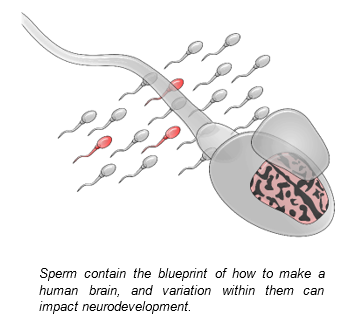Breuss Lab
For the most recent information on the laboratory, please visit the Breuss Lab homepage.

One of the greatest scientific discoveries of the last century was the realization that every cell—no matter how peculiar it appears—harbors an identical complement of genomic information. This idea paved the way for the cloning of entire organisms and cellular reprogramming. However, this is not to mean that every cell’s genome is identical: over its lifetime, each acquires a unique and distinguishing set of somatic mutations. We call this phenomenon genomic mosaicism, qualified as clonal if such a mutation occurs in a proliferating cell and, consequently, is present in its daughters.
The Breuss laboratory is interested in identifying clonal mosaicism in various tissues for two reasons: 1] if mosaic mutations are present within gonadal progenitors, they may be transmitted across generations and may cause congenital disease. Thus, understanding this phenomenon can be critical for the determination of recurrence or transmission risk in sporadic monogenetic disorders. 2] The analysis of shared and unique mosaicism enables retroactive lineage tracing across tissues and cellular populations; it further provides a unique window into mutational processes during early human embryonic development.
Our work encompasses the application of current mosaicism detection technologies—and the development of novel ones where needed—in a variety of contexts. Some of the questions addressed through this approach are the following: what is the extent of mosaicism across different tissues and individuals? From where does it originate? How does it impact human health?
Diversity, Equity, and Inclusion Statement
The Breuss lab believes that everyone should have equal access to science, and we strive to create an inclusive environment that welcomes and respects diversity in all its forms, including of culture, race, age, gender identity, sexual orientation, and ability. We value scientists as people first and believe that diversity of background increases creativity and innovation, and it will help us to become better scientists and humans. We reject all forms of racism and discrimination and acknowledge at the same time that we are all subject to biases counteracting our better judgment. We are committed to our ongoing learning about and improvement in these topics, and we welcome prospective lab members to share new ideas on how to support forms of diversity in our group and environment.
Martin Breuss, PhD
Principal Investigator
Martin was born in Austria (the one in Europe without the kangaroos) and did his undergraduate and graduate studies in Vienna. He performed his PhD studies with Dr. David Keays at the Institute of Molecular Pathology (IMP), Vienna. From his time there he maintains a love for tubulins and a conflicted relationship with pigeons. He then joined the laboratory of Dr. Joseph Gleeson at the University of California, San Diego, as a postdoctoral scholar where he worked on the elucidation of the genetics of recessive human disorders. During his time in southern California, he also discovered his love for genetic mosaicism, which complements his interest in cellular mosaicism during brain development.
When Martin is not in the lab, he enjoys watching and playing basketball, biking, playing board games, and eating new and exciting meals.
For Martin’s faculty page, please see here.
The Breuss lab is excited to receive applications from motivated and creative scientists with a passion to work at the interface of human genetics and developmental biology at all experience levels. Please send your letter of interest and a CV to Martin Breuss. For postdoctoral scholars, please also include contact information for at least two academic references.
For a full list of publications of the Breuss lab please see Martin’s Google Scholar page.
| Diversity / Equity / Inclusion |
We are committed to creating a diverse environment for students, residents, fellows, and faculty. We believe that an environment of inclusiveness and respect promotes excellence and that a setting where diversity is valued leads to the training of physicians who are prepared to practice culturally effective medicine and meet the needs of the various populations we serve. Visit our Diversity, Equity, and Inclusion webpage for more.... |
